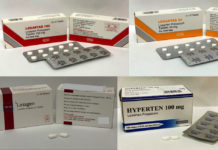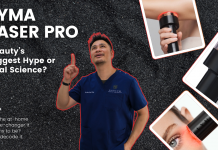You may or may not have heard of peptides in skincare creams, but you would definitely have come across it. Walk past any departmental store and you will see products like Lancome Genifique, Kinerase Pro+Therapy and countless others, promising to ‘activate your genes to give you more youthful skin‘. These products, in fact, make use of peptides for anti-ageing benefits.
The Search for the ‘Perfect’ Collagen
Collagen gives our skin its plumb and youthful appearance. As we age, we lose collagen, causing lines to form and skin to sag. For years, scientists have been trying to deliver collagen into the skin, but the attempts proved futile, as the the collagen molecule was too large to penetrate the formidable skin barrier. In recent years, cosmeceutical companies have started using soluble collagen – collagen molecules which have been broken down into much smaller fragments to facilitate absorption. Unfortunately, these do not do much for the skin, as the collagen fragments are too small to integrate with our skin’s own collagen.
What are Peptides?
Peptides are short chains of amino-acids, bound together by peptide bonds. Amino-acids are the building blocks of all proteins in our body, including the collagen and elastin in our skin. Each collagen molecule is, in fact, made of thousands of amino-acids pieced together and wound up in a triple helical network.
Although fragmenting the collagen molecule did not work, scientists found that something else did – peptide chains which resembled the collagen precursors. Amazingly, they found that some peptide chains which are structurally similar to the molecules which forms collagen stimulates the skin to increase the production of the key constituents of the skin matrix: collagen, elastin and glycosaminoglycans.
How do Peptides Work?
Scientists are only starting to realise the wonders of peptides. They have been around for only a few years, but we have discovered more and more different mechanisms in which they exert their beneficial effects.
1. Stimulate Collagen
These were the first peptides used, and are still widely used today. Popular peptides like Matrixyl (Palmitoyl Pentapeptide-4), Matrixyl 3000 (Palmitoyl Oligopeptide + Palmitoyl Tripeptide-7) and SYN-Coll (Palmitoyl Tripeptide-3) work by stimulating fibroblasts in the skin to produce collagen and elastin.
2. Relax Facial Muscles
This group of peptides, also called ‘neuropeptides’, are known to block the transmission of neurotransmitters in skin cells to relax the facial muscles – very much like Botox. Peptides in this group include Argireline (Acetyl Hexapeptide-3) and SYN-AKE (Dipeptide Diaminobutyroyl Benzylamide Diacetate).
3. Regulate Inflammation
Peptides like Rigin (Pamitoyl Tetrapeptide-7) helps control cytokines (Interluekine 6) secretion in the skin. Cytokines are responsible for the inflammatory process which contributes to skin ageing, hence, by restoring cytokine balance in mature skin, Rigin improves skin elasticity and firmness, as it hydrates and protects the skin.
4. Facilitate Copper Delivery
Copper has been used for years to treat chronic wounds, as research has shown that it is an effective agent in skin healing. It clears away damaged cells, rebuilds the skin’s circulatory system, activates the skin’s primary antioxidant protein and stimulates the production of new collagen. However, the cationic copper has problems penetrating the skin. Interestingly, when attached to a peptide, copper can be delivered more effectively deep into the dermis. These ‘Copper Peptides’, found in products like iS Clinical Super Serum, seem to promote collagen production, act as antioxidants and facilitate natural healing and regeneration of the skin.
Promising New Applications
Besides its anti-ageing properties, newer peptides are being produced for skin lightening. These peptides inhibit the formation of tyrosinase, the enzyme responsible for melanin production. Melanostatine®-5, or example, is a biomimetic peptide antagonist specific for the a-MSH (a- Melanocyte-Stimulating Hormone).
Many physicians have already realised the potential of these lightening agents, and are combining using them with other procedures such as Lasers and IPL for improved cosmetic outcomes.
The Downside- And What to Look Out For
While peptides may sound exciting, there are some points to note before you rush down to the nearest departmental store to pick up a bottle.
Peptides, being break-down products of proteins, tend to be unstable, and need to be stabilized or they will break down further and become useless. They also have to be present in the right concentrations – too low a peptide content and they will not work effectively; and strangely, for some peptides like Argireline, studies have shown that too high a content (more than 10% concentration) causes a reverse effect and for skin to sag!
Unfortunately, many good peptide creams will cost you a small fortune. My favourite peptide cream, Epicuren Ultima Peptide, retails for SGD $250 a bottle, but I still recommend it to my patients confidently, as it is absolutely worth every cent.
It may be extremely confusing to browse through the hundreds of anti-aging peptide creams. Check out my blog post detailing the different peptides, to get an idea on what ingredients to look for. Hopefully, these will give you a better idea on how to choose a better product.




















Hi, can you consider doing an article on mole removal?
Thanks!
OK! Will do that. Thanks for the suggestion!